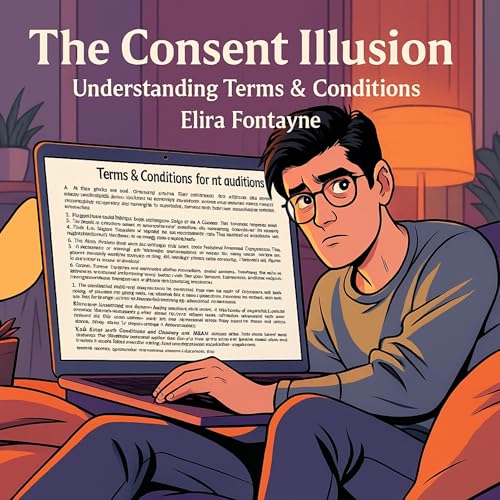
The Consent Illusion
Understanding Terms & Conditions
カートのアイテムが多すぎます
カートに追加できませんでした。
ウィッシュリストに追加できませんでした。
ほしい物リストの削除に失敗しました。
ポッドキャストのフォローに失敗しました
ポッドキャストのフォロー解除に失敗しました
2か月無料体験
聴き放題対象外タイトルです。プレミアムプラン登録で、非会員価格の30%OFFで購入できます。
¥900 で購入
-
ナレーター:
-
Herbert F. Mosley
-
著者:
-
Elira Fontayne
このコンテンツについて
Every time you click “I agree,” you’re entering into a legally binding contract—whether you realize it or not. Yet studies show that over 90% of people never read Terms & Conditions (T&Cs), and those who do rarely finish them. Why? Because they’re long, confusing, and designed to discourage scrutiny. But hidden in that wall of text are the rules that govern our digital lives: how companies use your data, what rights you waive, and what power you lose if something goes wrong.
This book explores what Elira Fontayne calls the “consent illusion.” On the surface, you are giving consent every time you tap the button. In reality, that consent is often uninformed, rushed, or based on blind trust in the platform. The illusion lies in the appearance of choice—when in truth, few users have the time, patience, or expertise to truly understand what they’ve agreed to.
Through ten clear and accessible chapters, The Consent Illusion takes you inside the world of T&Cs and shows why they matter more than ever:
- What T&Cs really are and why they function as the digital rulebook for every online service you use.
- Why they’re written in intimidating legal language that seems designed to confuse.
- How your data is collected and monetized—and why “free” services are never truly free.
- The dangers of indemnification and arbitration clauses, which can make you responsible for company legal troubles or strip you of your right to sue in court.
- How companies quietly change their terms and why your continued use is often treated as consent.
- What happens when you break the rules—from suspensions and bans to legal liability.
- Practical strategies for becoming a smart “aggregator” of information, spotting the most important sections, and protecting yourself without having to read every word.
Fontayne combines psychology, law, and digital culture to reveal why so many of us skip the small print, what companies gain from our indifference, and how we can reclaim some control in an online world built on consent-by-default. Along the way, she illustrates the trade-offs hidden behind our clicks—our privacy exchanged for convenience, our rights exchanged for access, our voices exchanged for speed.
Ultimately, this is not a book about scaring you away from digital services. It’s a guide to awareness. You’ll learn how to pause before you click, skim more effectively, use tools that highlight red flags, and recognize the essential trade-off between convenience and control.
In the end, The Consent Illusion argues that true digital citizenship begins with knowledge. Companies may still write the rules, but you don’t have to play blind. The next time you see that little box at the bottom of your screen, you’ll understand exactly what it means—and you’ll be ready to make a more informed choice.
©2025 Deep Vision Media t/a Zentara UK (P)2025 Deep Vision Media t/a Zentara UK


